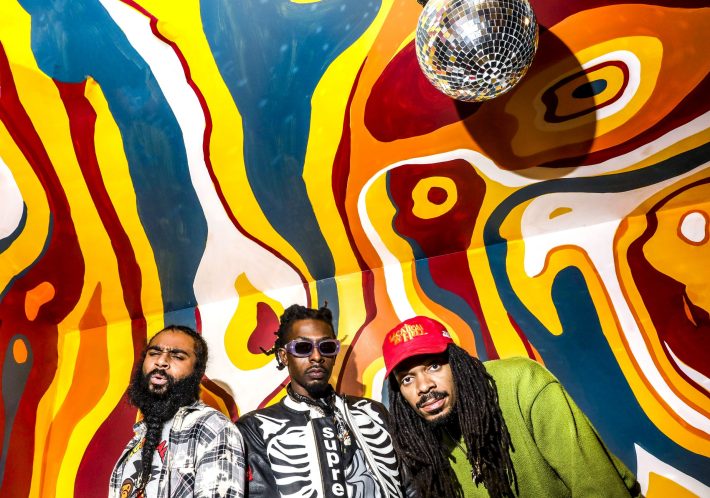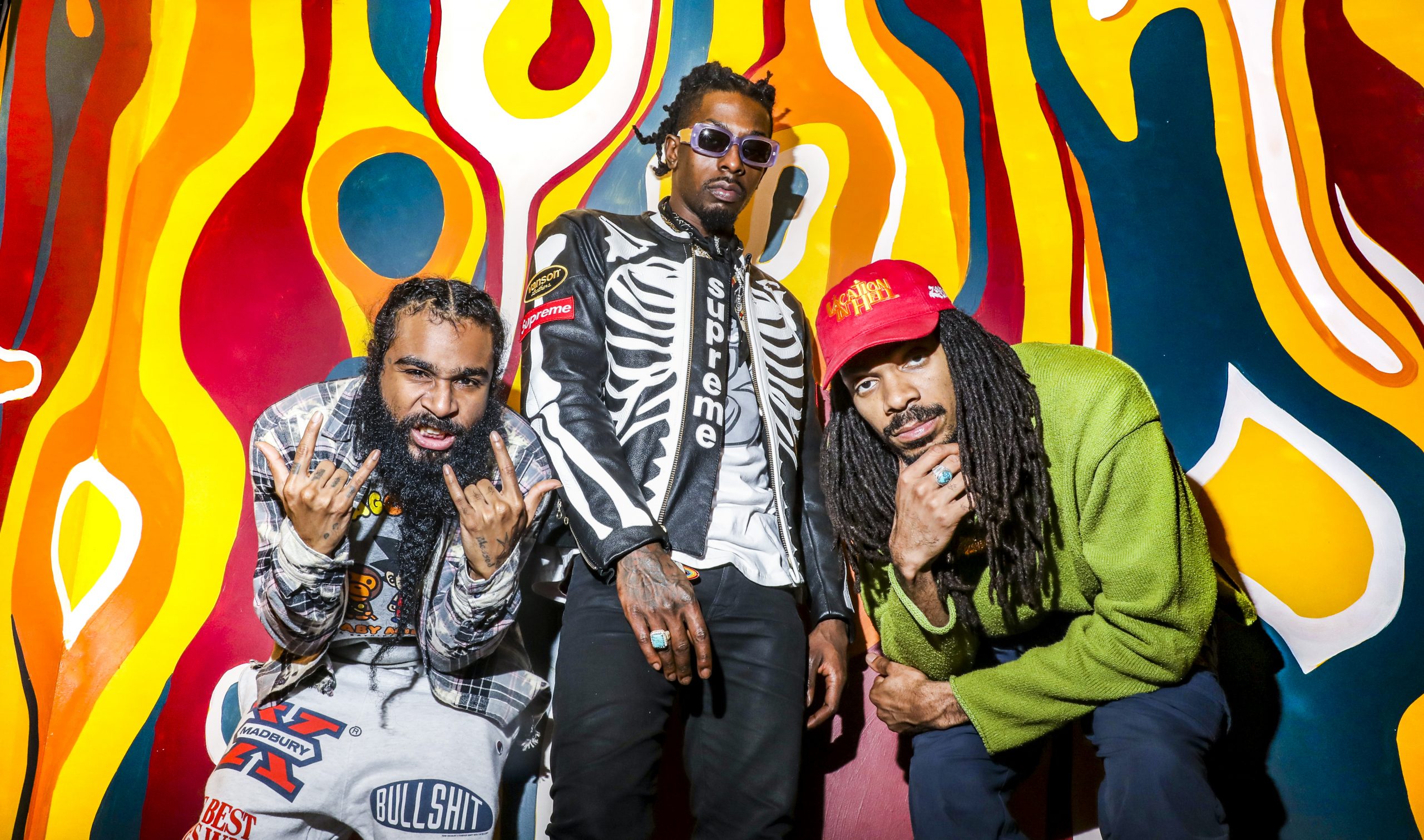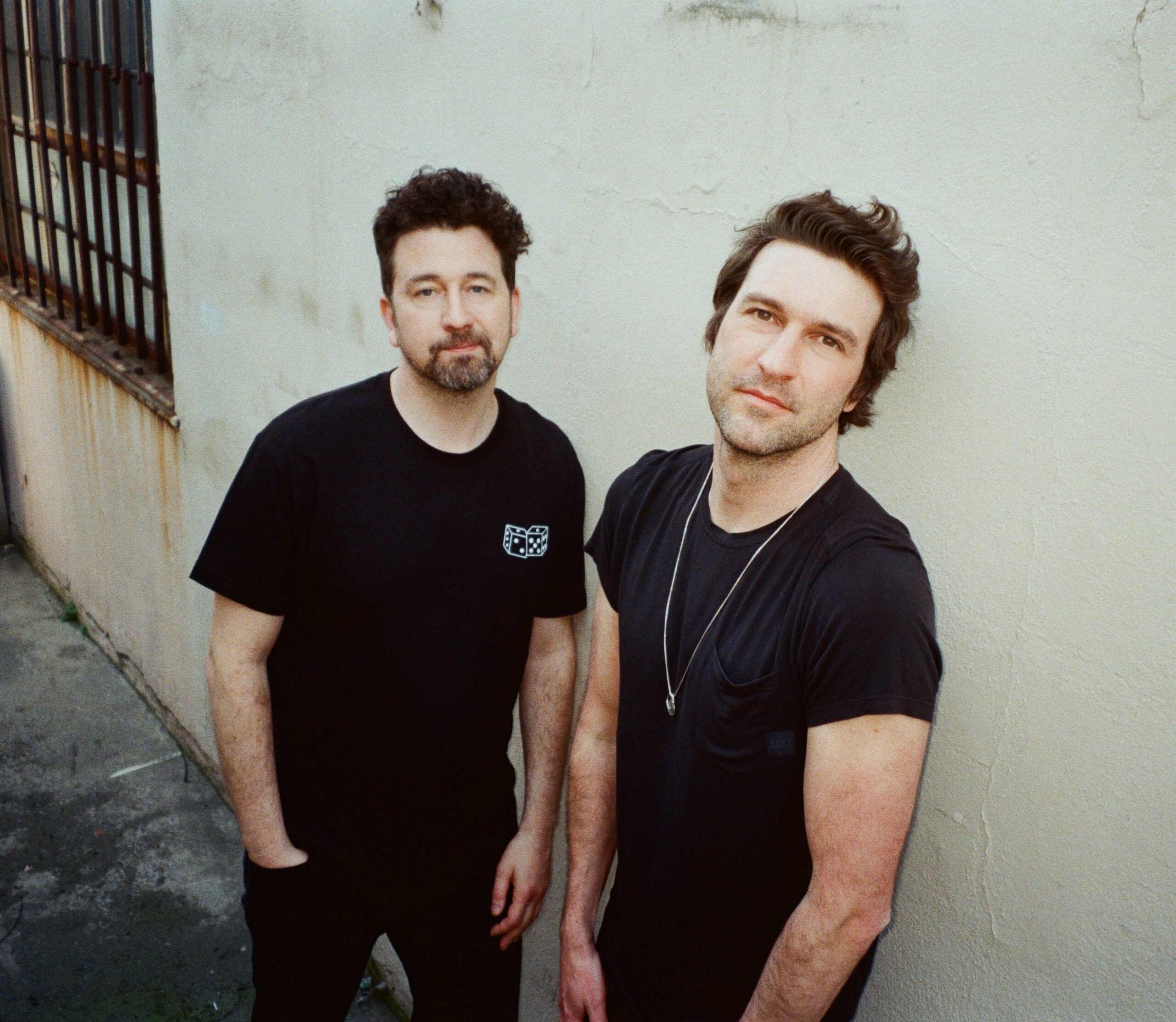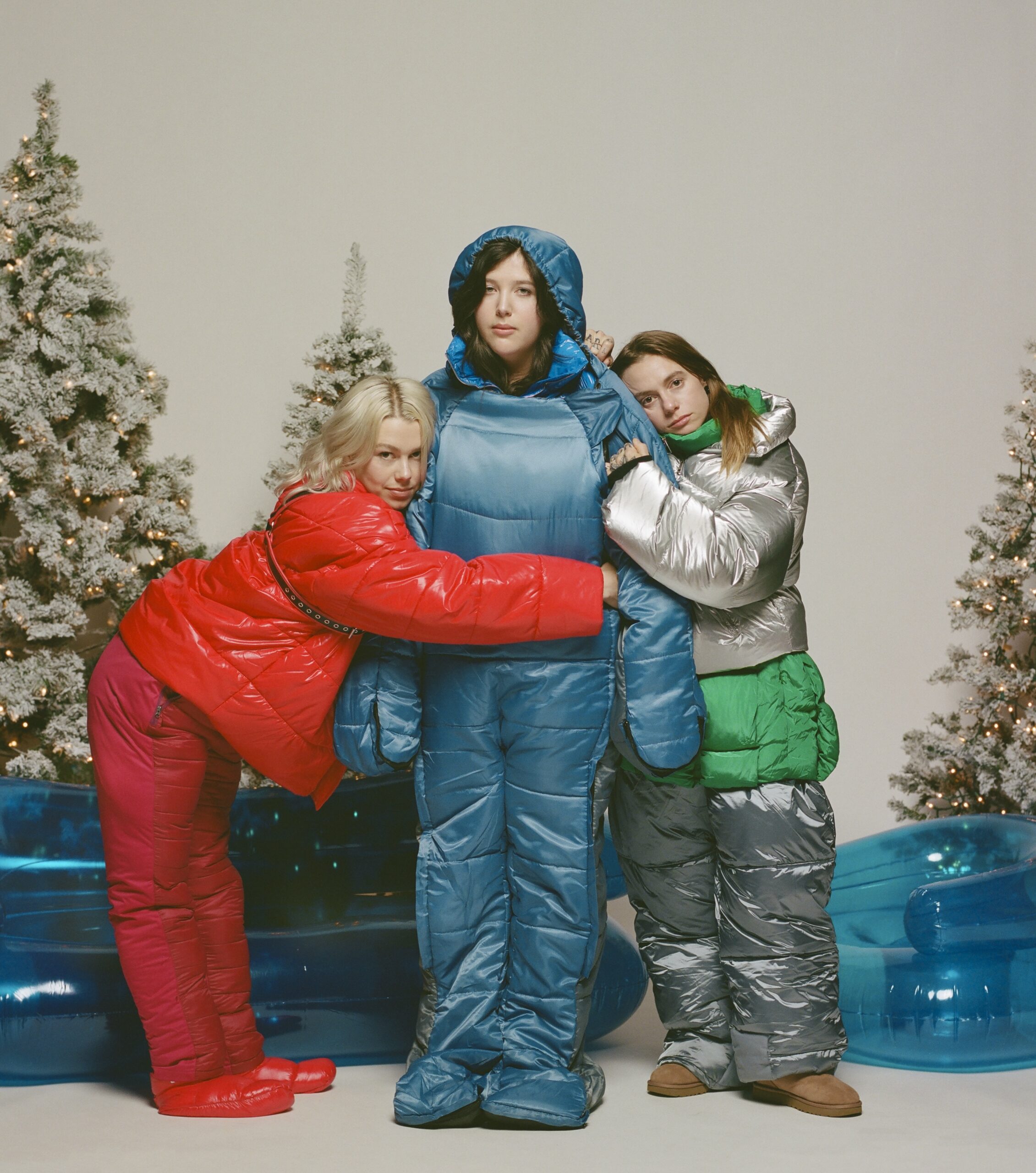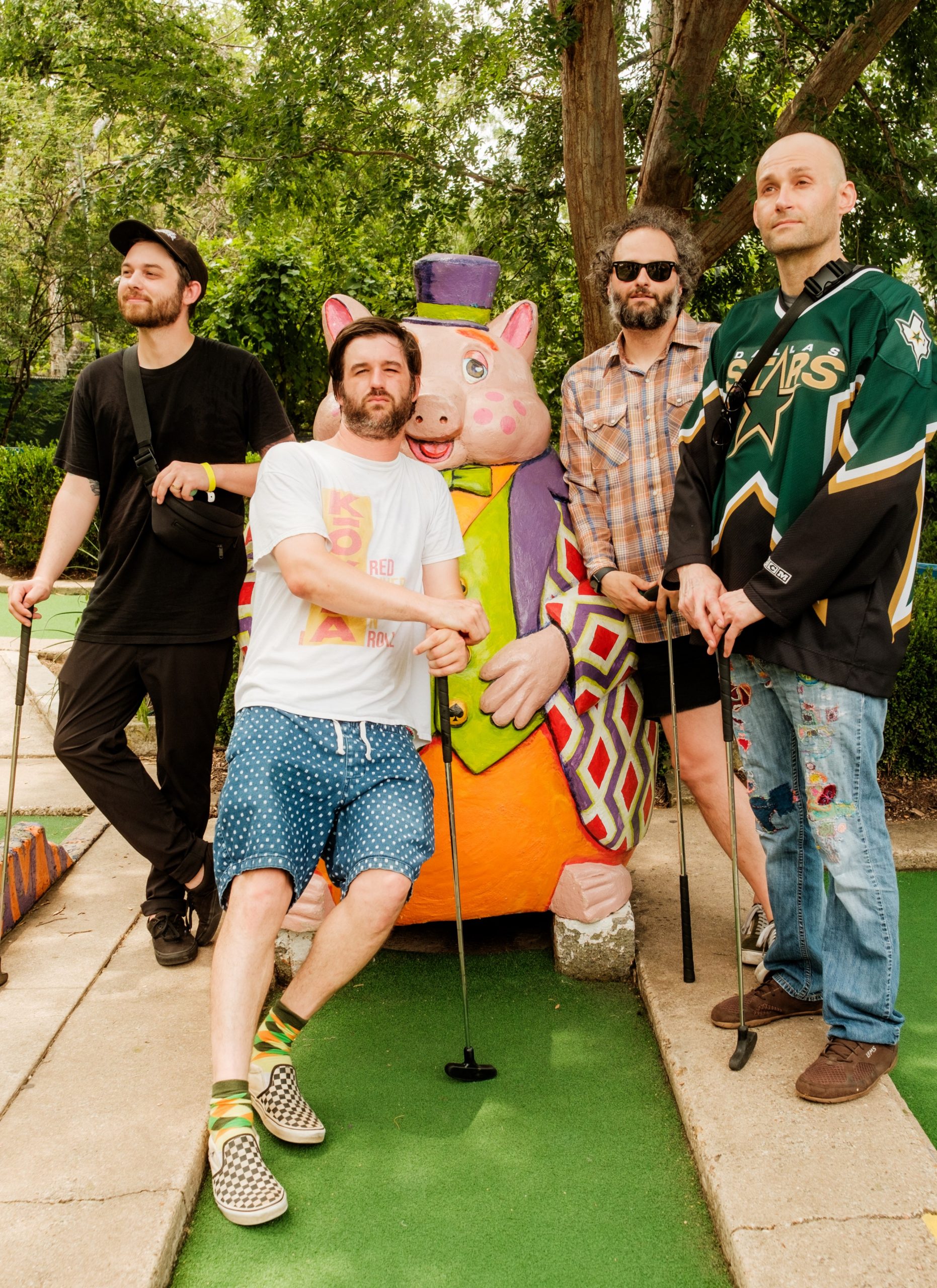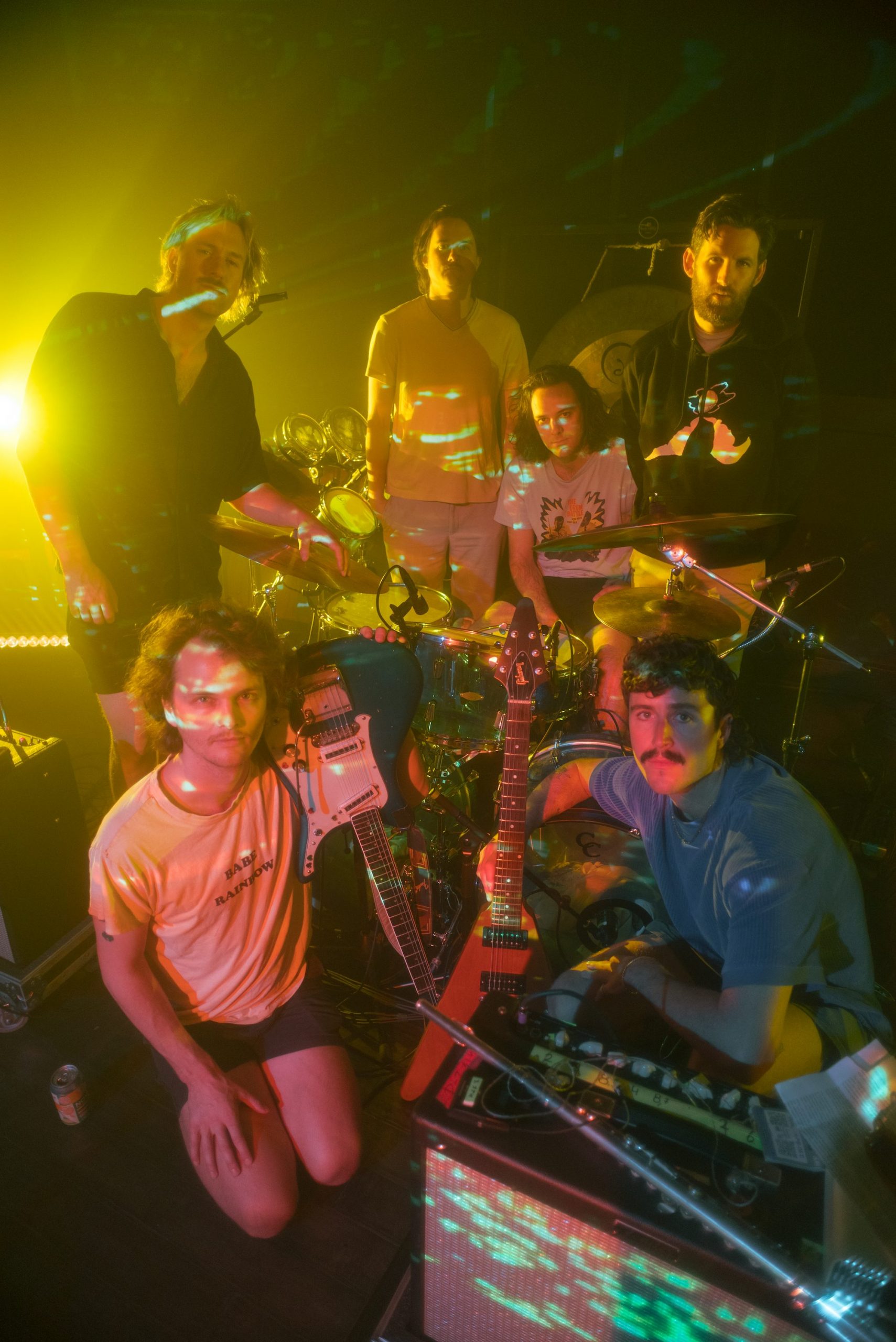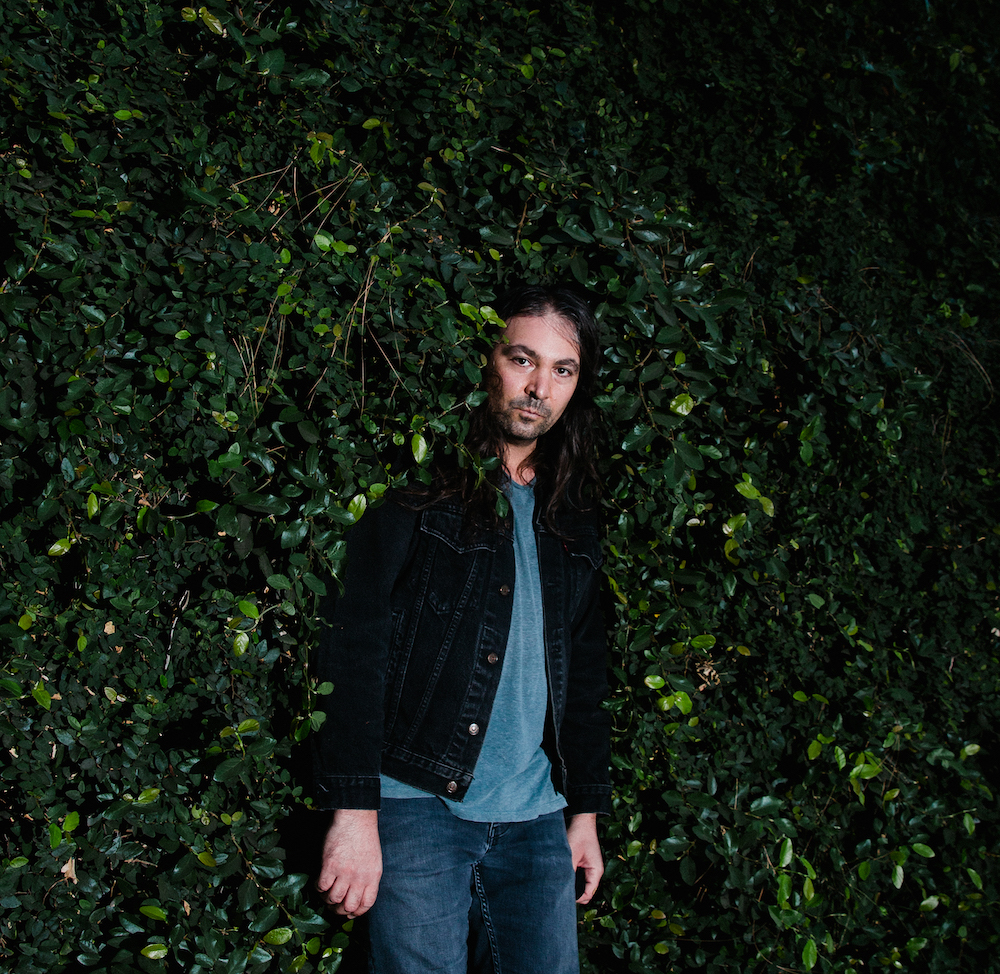And on their bold new Vacation In Hell, they prove it
Flatbush Zombies’ Meechy Darko contains multitudes. On April’s first Friday at their album release concert in Rough Trade’s Brooklyn shop, he’s shirtless rapping in a gravelly voice alongside his two other crewmates — rapper-producer swingman Erick The Architect and long-bearded fast-spitter Zombie Juice. It’s a crowd that ranges from the Rawkus Records generation to Pro Era’s, clean-shaven boys to scruffy men. Though diverse, the audience does have a lot of longtime fans. Plenty are rapping along to their woozy 2013 highlight "Palm Trees."
A little over 30 minutes later, when Flatbush Zombies emerge for a meet-and-greet, Meech is onto his Fleezus Christ persona. He’s wearing a pink fur coat and rose-tinted shades, awaiting the snaking line of attendees with a megaphone.
"I hope all of y’all bought the album and none of y’all stole it!"
Fleezus Christ isn’t Meech’s alter ego in the way Richard Morgan Fliehr becomes Ric Flair. Fleezus Christ is Meechy Darko is Dimitri Simms. It’s simply who he is.
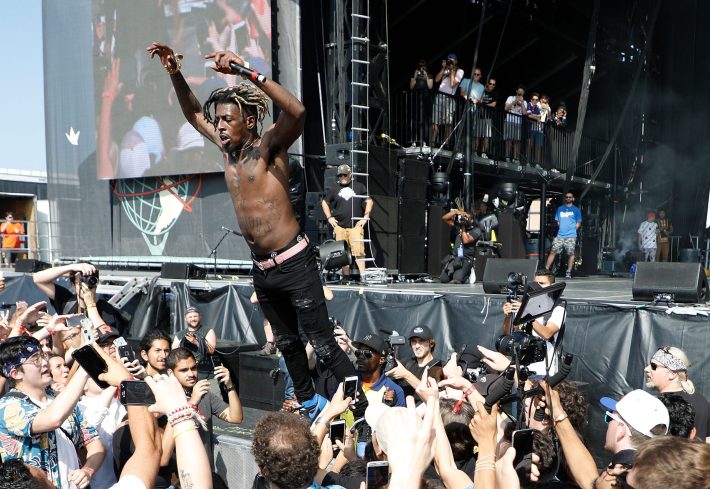
Since breaking out in 2012 with their debut mixtape D.R.U.G.S., Flatbush Zombies have stood apart with their kaleidoscopic production and surreal imagery. The group’s moniker mostly refers to the idea of ego death -- the spiritual idea of losing one’s self -- and the reawakening of a new state of mind. Their embrace of the ideas spin off of Meech’s and Juice’s psychedelic drug use that dates back to their teenage years.
The three were buddies long before crew raps, since back when their third eyes were still shut. Meech and Erick grew up on the same block deep in the Brooklyn neighborhood that lends the group its name — once rugged, it’s a brief walk from Kings Theater, which hosted an MGMT show last month. Juice, who grew up closer to the aggressive bustle of the Flatbush Junction, linked up with them in high school. With D.R.U.G.S., the Zombies were using chemistry they’ve been cooking their whole lives. Meech’s growl is the emotional center while Erick is responsible for the group’s structure. Juice, the technical stylist, glues together the two sides.
But as narratives tend to do, Flatbush Zombies' story has been painted in broad strokes in a way that makes an eccentricity the core of who they are. The trio has had to fight the dismissive "drug-rap" label throughout its career, regardless of whether there are actual drug references in their songs. Another category they’ve been lumped into that they’ve never quite understood is the 2011-14 New York rap renaissance movement.
The resulting wariness trails Flatbush Zombies even with the excitement surrounding the release of their sophomore album Vacation In Hell. This is evident when I meet the trio in Prospect Heights, Brooklyn, a few days after the album’s release. It’s a Tuesday afternoon that finally feels like springtime is starting to settle into New York, and we meet at Sweet Chick, a fried chicken and waffles spot that’s become a favorite of the guys in recent months.
Juice, whose beard is in sage-like braids, sits at the corner-most spot and semi-regularly leans into the recorder to affirm his crewmates’ thoughts. Erick — the most casually dressed in a green sweater and a Vacation In Hell cap that tops his shoulder-length dreads — delivers the most professional answers, dutifully responding when he’s prompted by Meech, who sits across from me, wearing a Supreme skeleton jacket, a Ruff Ryders tee, and purple, square-framed shades that never mask his expressiveness.
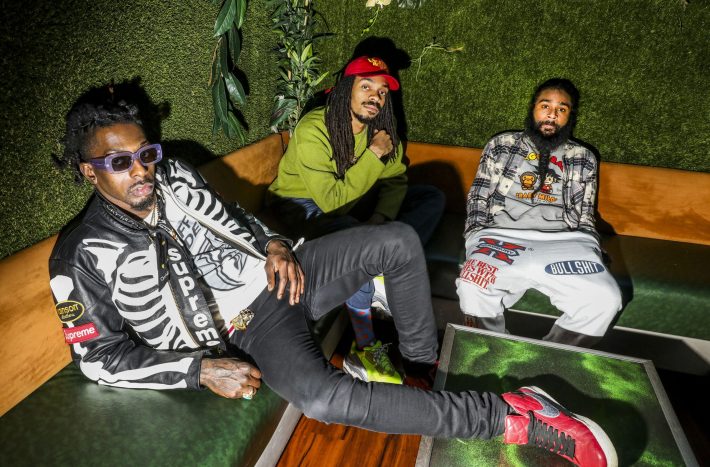
The members of Flatbush Zombies all answer with an emphatic nah when I provoke them with a question: "Is any of this — the loud hairstyles, horrorcore punchlines, bare-man nipple performances, the dark introspection, and open-your-third-eye messages -- is any of it an act?"
"No, niggaaaaa," Meech says. The whites of his eyes flicker; the extra a’s land like a gavel. "We don’t act over here. That’s why when I get interviews and people ask questions about a song, I’m like, ‘Damn, we said this on the song.’ I want this album to answer these questions forever."
I raised the question not out of genuine skepticism, but to needle him into giving more insight on Vacation In Hell’s penultimate track, "YouAreMySunshine," Meech’s tribute to the late legend A$AP Yams. On the song, he remembers being present the night Yams died. "Blue cold in my hands," he raps, regretful that he "wasn't man enough to see you in a coffin." Meech stops mid-verse on the verge of tears.
[videoembed size="full_width" alignment="center" orientation="horizontal"]https://youtube.com/watch?v=Plr_3LlitB8[/videoembed]
Erick, who knew Yams since he was a teen, emphasizes that there was a real bond between them. "[Yams] helped make that perception of us more unique than just, ‘Nah we can’t fuck with them’ … Without him, I don’t think people would take us seriously."
"Nothing we say on a song is going to be for kicks and giggles or just saying it just to say it," Meech says. "So, yeah. There’s no acting. Hell nah. We’re crying."
While Flatbush Zombies didn’t invent the phrase, Vacation In Hell works as a metaphor for the album’s two-sided structure. The first half is composed mostly of escapist, tour-ready bangers that feature assists from real hip-hop-heads icons Jadakiss and Bun B. But the bumping fists unclench on the second half to reveal scars: "U&I" finds Meech speaking on his lifelong struggles with depression ("When I was five, I told my mom I wanted to die"), while Erick swears he’d sell his cherished music equipment if his pals really needed the money. The two commiserate over anxiety and suicidal thoughts on "Trapped," and no one really bothers with a victory lap in the album-closing "The Glory," which finds Juice mourning deceased kin while Erick asks: "You see us as winners, when do we ever win?"
Flatbush Zombies as human beings who grieve and bleed isn’t a new concept (here's Juice over weepy strings on their debut: "Sometimes it's hard to breath/ I'm on my knees reaper, please leave my soul at ease"), but Vacation In Hell is structured to emphasize it. Sometimes the worldview gets lost in a group.
[videoembed size="full_width" alignment="center"]https://youtube.com/watch?v=DzLJCu95RKI[/videoembed]
"I think what we struggled with is that it’s all three of us. With our perspectives, sometimes the point of the song gets lost in the execution," Erick says. "I think we mastered, or we’re getting closer, to figuring out the balance between us three."
Vacation In Hell doesn’t solely rely on that duality, though. Erick streamlined the experimentation that gave Flatbush Zombies’ prior effort, 3001: A Laced Odyssey, its cinematic appeal, choosing to lay a sheen over its sonic designs. But the trio hasn’t jumped the sour diesel-influenced shark. Vacation In Hell offers cuts like the ghastly Joey Badass-featuring banger "Vacation," while on "U&I" Erick pulls the uncanny soul-sampling production together with a live choir that lends the track a confessional feel, breaking into new emotional territory.
In many ways, Vacation In Hell is also a response to the labels with which Flatbush Zombies have been tagged. The group would argue that they’re too shapeless to precisely fit into any box. The most notable affiliation is with what’s been called the New York Rap Renaissance -- a renewed wave of excitement from critics and fans generated by upstart acts in Harlem’s A$AP Mob and Brooklyn’s Beast Coast collective, which included the Joey Badass-led Pro.Era clique, Flatbush Zombies, and fellow mystic Flatbush natives the Underachievers. The Zombies gained popularity alongside their peers thanks to the popularity of their sludgy, sneakily catchy "Thug Waffle" and a feature on A$AP Mob’s 2012 cut "Bath Salts."
[videoembed size="full_width" alignment="center" orientation="horizontal"]https://youtube.com/watch?v=7snvaAmSHo8[/videoembed]
The acts didn’t bring New York back in a Hot 100-topping sense, but the movement’s stars have gotten along well after the concentrated hype dissipated. A$AP Rocky’s recent comeback single "A$AP Forever" was unquestionably a moment-of-note, and Joey Badass has maintained his underground credo while leaning a bit into the mainstream game, scoring a platinum plaque with "Devastated" and ghostwriting Post Malone’s #1 hit "Rockstar." On the other hand, Flatbush Zombies have been proudly independent since their formation in 2010.
"I never even want to go into one of them fuckin’ building where you gotta show your IDs and meet up with some niggas and all that shit," Meechy says. "We were so uncomfortable in them first meetings, bro. That’s not my vibe, where [label people] gonna come and do this weird shit where they want me but they’re gonna act like they don’t want me too much. And then I gotta do the dance, too? I ain’t dancing."
Juice interjects with a smirk: "We’re our own bosses, man."
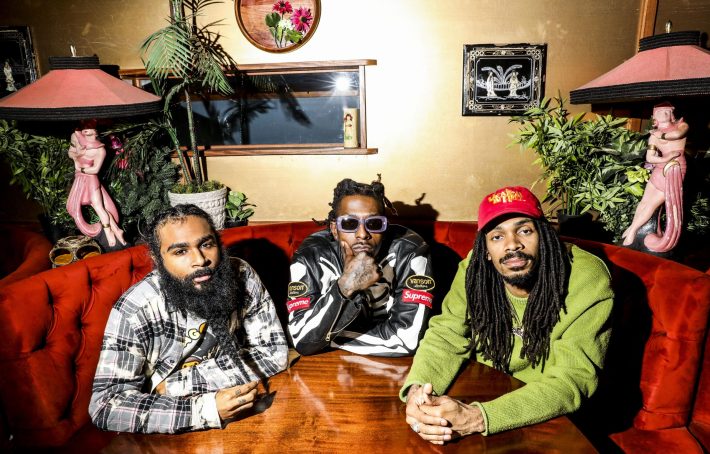
As independent artists who self-release their music, Flatbush Zombies have sustained themselves with a cult-like following, but they haven’t stumbled into that mainstream success they don’t particularly care for. Other New York up-and-comers have catapulted to the mainstream in the time it took Flatbush Zombies to write and record a sophomore album. Over the past two years, artists like the street-chiseled Dave East are at least adjacent to the throwback NY lane that Joey Badass occupied. Then there’s the supernova that’s Cardi B, whose debut album Invasion Of Privacy dropped the same day as Vacation In Hell. Flatbush Zombies aren’t bitter about the shared release date ("I bought the album before I got here," quips Meech), but they’re incredulous that anyone might suggest we’re in the midst of another New York rap renaissance. Didn’t we already have one?
That’s not my vibe, where [label people] gonna do this weird shit where they want me but they’re gonna act like they don’t want me too much. And then I gotta do the dance, too? I ain’t dancing.
"After you said the renaissance was before, there’s another renaissance four years later?" Meech says, his voice rising an octave. "Then there wasn’t a renaissance before. Stop labeling shit. Let niggas make this music."
The conversation takes an existential turn after the Zombies finish their waffles. For a city as impossibly diverse as New York, the four of us try to nail down a question: What exactly is the New York sound?
"You’d say Jay-Z’s the New York sound," Meechy says, referencing my "The Story Of OJ" T-shirt. "Timbaland’s from VA; Pharrell’s from VA. He gets produced by a lot of niggas who’re not from New York. What does it really mean?" DJ Khaled’s Carters-featuring "Shining" plays through the restaurant’s soundsystem, as if to punctuate Meech’s point.
[videoembed size="full_width" alignment="center" orientation="horizontal"]https://youtube.com/watch?v=MZ924VGx5n0[/videoembed]
The trio seem to at least agree on New York being a hardened sensibility instead of an aesthetic. Even on Erick’s airiest production, the Zombies sound pugilistic, whether it’s Meech barreling through or Juice bobbing and weaving with his flow. It’s an edge that follows them outside of the booth, even in a neighborhood as soft as Prospect Heights.
"You can still get robbed, shot, killed, and arrested by a cop. You can still get robbed, shot, killed, and arrested by a regular person," Meech says. "The day you lose that edge, you ain’t a real New Yorker."
"I don’t even like sitting the way I am, because I can’t see the door," Erick adds. A Starbucks is part of a row of stores that grill his back.
"Earlier before the interview started, I thought I seen somebody from my past, nigga. I got scared as hell," Meech continues.
Then Meech goes from spooked to weirded out: "One time I seen this dude on the corner barefoot, with a low-drop fuckin’ ... what you call it? A tanktop? And he got up out the chair and walked up to the corner to throw his coffee in the garbage barefoot. And I looked at him and said, ‘It’s amazing to me that this nigga is this comfortable in this neighborhood that friends of mine would’ve been killed at.’ Why are you so comfortable here?" -- his voice swings up a pitch again in disbelief -- "How’d you get here and get this comfortable?"
As we take to the Brooklyn streets after lunch, Meech walks a few footsteps ahead with the trio’s manager while Juice, Erick, and I bond over the insanity of growing up in aughties New York. We reminisce about having the misfortune of sitting in the back of the bus during snow days in Brownsville, where children would pelt passengers with piss-covered snowballs. Then we touch on the long-shuttered Empire Skating Rink, a venue whose constant threats of violence didn’t turn away as many patrons as it should’ve.
When the conversation turns to our shared misanthropy -- we all agree you don’t really have to befriend whoever you work with -- Erick gets peevish when we discuss metrics of success. To an outsider, an artist who gets a chart-topping release is seen as someone who simply worked harder than competitors. But it’s a myopic conclusion that discounts projects like Vacation In Hell, which had two years of work put into it.
[videoembed size="full_width" alignment="center"]https://youtube.com/watch?v=2I73yB5wDfU[/videoembed]
We unpack that discrepancy as our time together ends on a sober note. After our photoshoot at a nearby venue, Juice sits and rests his head on his right shoulder. He can barely keep his head up. Meech is still behind his shades, leaning only slightly to his side as he answers some more of my questions. And Erick -- after enduring camera flashes that aggravated his astigmatism -- leans forward, elbows on his thighs.
"A majority of people gauge how good something is by how much numbers it has," Erick says. "And if that was the case for us, we wouldn’t be here. The reason why I’m putting it out there is because if someone is not having mad numbers, you shouldn’t stop making music because your shit is not on Billboard."
For what it's worth, 3001: A Laced Odyssey entered the Billboard 200 at #10, no small feat for an independent rap group.
"To me, though, it don’t matter when the niggas on the Billboard take shit from you anyways," Meech says, not giving specifics and silently prompting Erick to finish his thought. "So you’re influencing a nigga influencing. So why be on here arguing about it? Don’t matter at the end of the day."
But they do take pride in the small victories. Meech explains that a rapper told him that he never sees negative comments toward them and about a 14-year-old kid who said the Flatbush Zombies were the most important thing in his life. It’s the sort of message that keeps a punk spirit like Meech reassured, and one of the many things that keeps him "reawakening."
"I’m reawakening all the time. I’m reawakening right now, when this album comes out and people are writing reviews in 15 minutes. I’m remembering how crazy humans are."
As if on cue, an exhausted, sedentary Juice comes back to life and laughs.
